

The National Assembly has approved the Student Loan Bill. They made this decision on Wednesday after looking at a report from the Committee on Tertiary Institutions and Tertiary Education Trust Fund (TETFUND). Senator Mohammed Muntari, who represents Katsina South, presented the report.
The purpose of this bill is to help poor Nigerians go to college or university by giving them loans that don’t have any interest. These loans come from the Nigerian Education Loan Fund (NELF) to help everyone in Nigeria get an education. The approval of the bill happened a few days after they stopped plans to start the student loan program for an unknown amount of time.
On March 14, President Bola Tinubu asked the Senate and the House of Representatives to cancel the old Student Loan (Access to Higher Education) Bill and replace it with a new one.
Fulfilling one of his promises from his campaign, President Bola Tinubu signed the student loan bill into law on Monday, June 12. This bill helps students who don’t have much money by offering them loans without any interest to pay for their education.
The bill was introduced by Femi Gbajabiamila, who was the last Speaker of the House of Representatives and is now the President’s chief of staff. It’s aimed at helping students in universities, polytechnics, and colleges of education that are run by the federal or state governments. Although the National Assembly approved the bill in November 2022, the previous President, Muhammadu Buhari, didn’t sign it into law for reasons that are not clear.
While many people think this is a good idea, there are others who are skeptical about whether the bill will really help fix the education sector’s problems. Some teachers have criticized parts of the new law, particularly how students are supposed to pay back the loans.
There’s still a lot of uncertainty about how the law will be put into practice, like how to get a loan, how to pay it back, and other rules.
Here are five important points about the bill that’s causing a lot of discussions:
- The bill sets up the Nigerian Education Bank to give loans to students who need them, without charging interest. The bank will get its money from various sources, including education bonds, funds, and taxes from the Federal Inland Revenue Services, the Nigerian Immigration Service, and the Nigerian Customs Service. Another source is a percentage of profits from oil and minerals. The bank will also keep an eye on students’ academic and career progress to make sure loans are paid back.
- Students will start paying back their loans two years after they finish their National Youth Service (NYSC), with 10% of their salary being used for repayment.
- A professor and a retired vice chancellor will lead the governing board of the education bank.
- To get a loan, students can only use it for tuition fees and must apply through their schools. They must come from families earning less than N500,000 a year and provide two guarantors.
- The bill also says students who have not paid back loans before, cheated on exams, been convicted of drug use, felony, dishonesty, or whose parents haven’t paid back any loans won’t be considered for a new loan. Those who don’t follow the rules could be fined N500,000, face two years in jail, or both.
The federal government announced through Andrew David Adejo, from the Ministry of Education, that the loan program is expected to start in September/October 2023. They are working on setting up the process for students to apply for these loans.
Read Also: ASUU- Beneficiaries of Students loan scheme will be in permanent debt
Students Loan Launch Postponed Indefinitely
